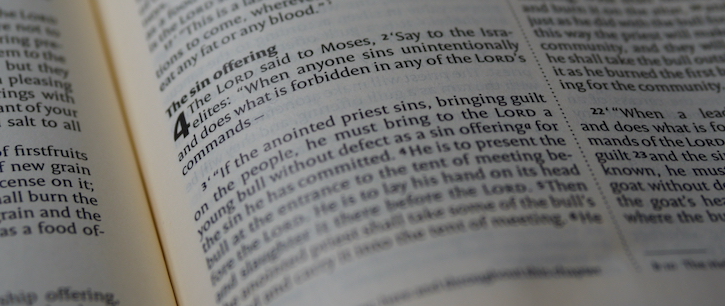
When I remember my grandma—my mom’s mother— I see her working in her kitchen. She fed a large extended family, cooked everything from scratch on a wood burning stove, and washed the dishes by hand in a big farmhouse sink. Food prep and clean up required hours of work every day. She peeled and chopped, kneaded and shaped, adjusted the fire in the stove, stirred cooking pots, and then scrubbed everything down afterwards. When one meal was finished, she started preparing the next. I’m sure she sat down for a break sometimes, but that’s not how I remember her. I remember her in her kitchen, standing over the sink or stove.
The Levitical priests of the Old Testament were a little like my grandma. The author of Hebrews wrote this about them:
And every priest stands daily at his service, offering repeatedly the same sacrifices, which can never take away sins (Hebrews 10:11 ESV).
An old covenant priest performed the same duties over and over again. He offered the same sacrifices day in and day out. My grandma stood in her kitchen, repeating food prep chores every day, meal after meal, because the food she served couldn’t permanently satisfy hunger. The Levitical priest stood in the tabernacle, repeating the same sacrifices day after day, because the sacrifices he offered were not a real solution to the problem of human sin. The repetitive nature of the priest’s work was evidence of its futility.
There is a reason the Old Testament sacrifices were ultimately ineffective. If we had read through Hebrews 10 from start to finish, we would have already seen that “it is impossible for the blood of bulls and goats to take away sin” (Hebrews 10:4). No animal was an adequate substitute for a human being. No animal could bear God’s just wrath against human sin. No animal sacrifice could cleanse someone’s conscience, so old covenant worshippers remained aware of their guilt before God (Hebrews 9:9, 10:2).
It isn’t as if animal sacrifices had no point. God instituted them, and he has good reasons for everything he does. One of those good reasons is that the repeated nature of animal sacrifices was meant to be a reminder of sins (Hebrews 10:3). Their futility had a purpose: it showed that they didn’t actually save anyone from sin. Animal sacrifices pointed people to their need for something—or someone—greater. They needed a better sacrifice—an effective one.
That better sacrifice, the one the old sacrifices pointed to, was Jesus. Hebrews 10:12-14 says this about him:
But when Christ had offered for all time a single sacrifice for sins, he sat down at the right hand of God, waiting from that time until his enemies should be made a footstool for his feet. For by a single offering he has perfected for all time those who are being sanctified. (ESV)
The old priests and sacrifices were, to use a phrase from verse 1 of this chapter, merely “a shadow of the good things to come,” and Christ and his sacrifice are the good things to come. In every way, Christ is better than the old system that foreshadowed him. The old sacrifices had to be repeated, over and over again, day in and day out, but Christ offered a single, definitive sacrifice that was effective “for all time.” The old sacrifices didn’t take away sin, but reminded people of it. With Christ’s sacrifice God “remembers sins no more” (v. 17). The old sacrifices couldn’t cleanse consciences, but Jesus’s sacrifice removed guilt forever.
The Old Testament priests stood daily as they worked, but Christ offered one sacrifice of himself and then he sat down at the right hand of God. He is resting because his work is done. His sacrifice will never need to be repeated, because it solved the problem of human sin by “perfect[ing] for all time those who are being sanctified.” Believers are not yet perfect, of course, if by perfect we mean they no longer sin. We all still struggle with sin in this life. But the author of Hebrews didn’t use the word perfect this way. His point was that believers’ sins were taken away, their guilt was removed, and they were forgiven. Christ’s sacrifice cleansed them completely and forever. They have been perfected and his work is finished.
So Christ sat down—and look where he sits! He is at the right hand of God, in a place of unlimited power, highest authority and ultimate triumph, waiting for his enemies to be crushed. The work that will bring him certain victory over them was finished when he died and rose again. His enemies are not yet lying under his feet, but in the last scene of God’s unfolding drama, they will be, because Christ’s work is finished and their final outcome is certain.
And because Christ is resting, every believer can rest in the forgiveness he accomplished for us. What’s more, because he rests, we can come. Our sins have been taken away, and God is reconciled to us, so
we have confidence to enter the holy places by the blood of Jesus, by the new and living way that he opened for us … . [L]et us draw near with a true heart in full assurance of faith, with our hearts sprinkled clean from an evil conscience and our bodies washed with pure water (Hebrews 10: 19-22 ESV).
Our full assurance of forgiveness and our bold approach to God is grounded in Christ’s completed work. That our Priest is a sitting Priest confirms to us that our hearts have been sprinkled clean, our bodies have been washed, and we are forever fully forgiven.
The Better Sacrifice came, sacrificed himself, and now sits at the right hand of God. Jesus opened the new and living way for us, and we can enter God’s presence with confidence. Let us draw near!